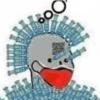In addition to my wife's dramatic decrease in A1C sugar levels (from 9.8 to 6.4 in less than 3 months), I forgot to mention the 65 pound weight loss, all without counting calories!
In doing research on some of the Ketogenic studies, I stumbled upon these interesting links.
There seems to be a bounty of positive results in this no-carbohydrate ketogenic type diet.
Especially when you add Fish as a source of protein and Omega-3 oils.
Benefits include lowering body mass, weight, blood pressure, cholesterol, triacylglicerols, glucose, LDLc, and an extremely significant increase in HDLc.
Even shrinking prostate cancer tumors!
(Omega-6 found in beef seems to inflame the prostate and should be avoided by men with an enlarged prostate or prostate cancer.)
Spanish Ketogenic Mediterranean Diet: a healthy cardiovascular diet for weight loss.
BACKGROUND:
Ketogenic diets are an effective healthy way of losing weight since they promote a non-atherogenic lipid profile, lower blood pressure and decrease resistance to insulin with an improvement in blood levels of glucose and insulin. On the other hand, Mediterranean diet is well known to be one of the healthiest diets, being the basic ingredients of such diet the olive oil, red wine and vegetables. In Spain the fish is an important component of such diet. The objective of this study was to determine the dietary effects of a protein ketogenic diet rich in olive oil, salad, fish and red wine.
METHODS:
A prospective study was carried out in 31 obese subjects (22 male and 19 female) with the inclusion criteria whose body mass index and age was 36.46 +/- 2.22 and 38.48 +/- 2.27, respectively. This Ketogenic diet was called "Spanish Ketogenic Mediterranean Diet" (SKMD) due to the incorporation of virgin olive oil as the principal source of fat (> or =30 ml/day), moderate red wine intake (200-400 ml/day), green vegetables and salads as the main source of carbohydrates and fish as the main source of proteins. It was an unlimited calorie diet. Statistical differences between the parameters studied before and after the administration of the "Spanish Ketogenic Mediterranean diet" (week 0 and 12) were analyzed by paired Student's t test.
RESULTS:
There was an extremely significant (p < 0.0001) reduction in body weight (108.62 kg--> 94.48 kg), body mass index (36.46 kg/m(2)-->31.76 kg/m(2), systolic blood pressure (125.71 mmHg-->109.05 mmHg), diastolic blood pressure (84.52 mmHg--> 75.24 mmHg), total cholesterol (208.24 mg/dl-->186.62 mg/dl), triacylglicerols (218.67 mg/dl-->113.90 mg/dl) and glucose (109.81 mg/dl--> 93.33 mg/dl). There was a significant (p = 0.0167) reduction in LDLc (114.52 mg/dl-->105.95 mg/dl) and an extremely significant increase in HDLc (50.10 mg/dl-->54.57 mg/dl). The most affected parameter was the triacylglicerols (47.91% of reduction).
CONCLUSION:
The SKMD is safe, an effective way of losing weight, promoting non-atherogenic lipid profiles, lowering blood pressure and improving fasting blood glucose levels. Future research should include a larger sample size, a longer term use and a comparison with other ketogenic diets.
http://www.ncbi.nlm....pubmed/18950537
Carbohydrate restriction, prostate cancer growth, and the insulin-like growth factor axis.
Recent evidence suggests carbohydrate intake may influence prostate cancer biology. We tested whether a no-carbohydrate ketogenic diet (NCKD) would delay prostate cancer growth relative to Western and low-fat diets in a xenograft model.
CONCLUSIONS:
In this xenograft model, despite consuming more calories, NCKD-fed mice had significantly reduced tumor growth and prolonged survival relative to Western mice and was associated with favorable changes in serum insulin and IGF axis hormones relative to low-fat or Western diet.
http://www.ncbi.nlm....pubmed/17999389
Dietary intervention strategies to modulate prostate cancer risk and prognosis.
PURPOSE OF REVIEW:
There is increasing interest in complementary and holistic approaches for cancer prevention and management. We sought to review the latest literature regarding dietary interventions for prostate cancer with a special emphasis on dietary fat and carbohydrate intake for modulating prognosis among men with prostate cancer.
SUMMARY:
Small clinical trials suggest that tumor biology can be altered by either a vegan low-fat diet or eliminating simple carbohydrates accompanied by weight loss. Larger and longer term studies are needed to determine the clinical relevance of these findings.
http://www.ncbi.nlm....pubmed/19300265
Omega-3 fatty acids and cardiovascular disease: epidemiology and effects on cardiometabolic risk factors.
Clinical and epidemiological studies provide support that the polyunsaturated omega-3 fatty acids eicosapentaenoic acid and docosahexaenoic acid from fish and fish oils are cardioprotective, particularly in the setting of secondary prevention. Omega-3 fatty acids benefit multiple cardiometabolic risk factors including lipids, blood pressure, vascular reactivity and cardiac function, as well as having antithrombotic, anti-inflammatory and anti-oxidative actions.
Health authorities currently recommend an intake of at least two oily fish meals per week for the general population which equates to approximately 500 mg per day of eicosapentaenoic acid and docosahexaenoic acid. In patients with coronary heart disease the guidelines recommend 1 g daily supplements and in hypertriglyceridaemic patients up to 4 g per day. These doses are now achievable with readily available purified encapsulated preparations of omega-3 fatty acids.
However, a more practical recommendation for increasing omega-3 fatty acid intake in the general population is to incorporate fish as part of a healthy diet that includes increased consumption of fruits and vegetables, and moderation of salt intake.
Edited by Rogerdodger, 27 July 2014 - 09:15 PM.

















